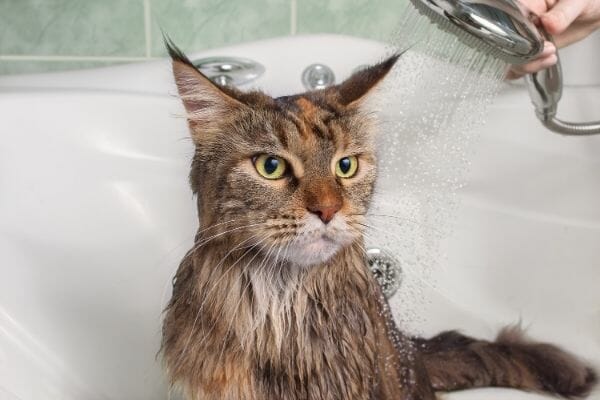Most people think cats detest water, avoiding liquid substances or bodies of water at all costs. But the truth of the matter is that not all cats feel the same way. Depending on your cat’s upbringing and early experiences with water, she may or may not like being directly in contact with it.
In this Waldo’s Friends article, we answer water-associated questions in relation to your cat:

Do cats hate getting wet?
Not all cats hate getting wet. If your cat grew up having positive interactions with water (i.e. being gently washed as a kitten), it’s likely that she won’t get anxious when you give her a bath. On the other hand, cats who’ve never had a bath may fear the unfamiliar environment (the slippery sink or bath tub) as well as the new sensations (the spray of the water or the scent of the shampoo) attached to it.
There are theories as to why some cats hate water. Scientists have deduced that their ancestors came from the desert, with little exposure to water. Aside from this, cats’ undercoats don’t dry fast, which makes them feel cold and uncomfortable whenever they get wet. (In case you didn’t know, the undercoat is responsible for keeping cats warm and insulated whenever it’s cold.) Plus, the added water weight may also encumber their agile bodies, which makes it difficult for them to escape from possible danger.

Can I give my cat a bath?
Yes, you definitely can! Even if cats are experts at grooming themselves, it doesn’t hurt to give your cat a bath when she gets extremely dirty, has fleas, or has a medical condition that requires bathing. If you manage to care for or adopt a young kitten, try to expose her to water and bathing as early as possible. That way, she won’t grow up feeling anxious or even aggressive when she knows she’s due for a bath.
When bathing your cat, make sure to use pet-safe shampoo made especially for her fur and skin. Do not use human-formulated shampoos that may contain harsh chemicals for her. As for cats with medical conditions, only use products that are approved by your veterinarian. Be gentle with your cat, especially if it is her first time to receive a bath. Gently massage the shampoo into her fur, and thoroughly rinse it with lukewarm water. Be careful not to spray water on your cat’s head and ears. Afterwards, give her a treat and praise her with soothing words to make it a positive experience for her.

Can cats swim?
Cats, in general, should be able to swim. Whether because of necessity or for survival, cats have shown time and again that they are physically capable of swimming. It is part of their instincts as cats. However, the more vital question is, do they really want to swim? And are they good at it? Cats without previous experience in the water will most likely panic despite being able to naturally float.
Some cat breeds are known for being water lovers. These include the Van cats, Turkish Vans, Bengal cats, Maine Coon cats, American Shorthair, American and Japanese Bobtails, Turkish Angora, and Norwegian Forest cats. Turkish Van cats and Maine Coon cats are said to have a unique type of water-repellent coat that allows them to swim for long periods of time.
Even if your cat does not belong to the breeds previously mentioned, it doesn’t mean she can’t have a good relationship with water. It’s all about gradually exposing your cat to water, and making her grow accustomed to it. Start small. Bring her near a pool and see how she reacts to it. Let her walk around the vicinity while keeping an eye on her. If she appears disinterested, do not force it.
TIP: If you own pets and have a swimming pool at home, be sure to invest in a pool cover. This will prevent accidents from occuring, especially when you are not around.
In conclusion
Water may be a pleasant or neutral experience for your cat as long as she is introduced to it in positive ways. Given the right conditions, you can get her wet, give her baths, or even swim alongside her!
Read up on other intriguing cat behaviour in our blog. Find out why your cat bites you, why she kneads, or why she licks your hair.
Leave a comment
Your email address will not be published. All fields are required.